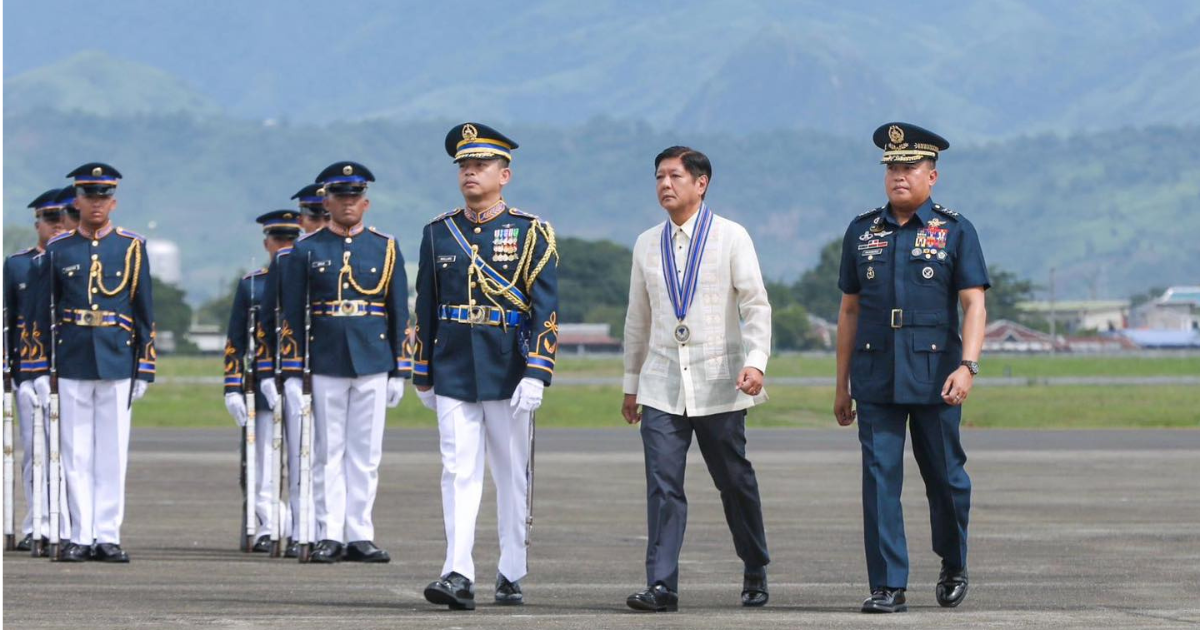Discord in the Marcos security team?

President Ferdinand “Bongbong” Marcos at the Philippine Air Force’s 70th founding anniversary. Photos courtesy of Presidential Communications Office.
By Manuel Mogato | Date 07-11-2024
MANILA — An open letter to President Ferdinand Marcos Jr. from a supposed group of active-duty military officers, urgently calling for the removal of Defense Secretary Gilberto Teodoro Jr, has been circulating on social media.
The unsigned, open letter blamed the defense chief for the humiliation of the Navy’s elite SEAL team at the hands of Chinese Coast Guard members on June 17 in Ayungin Shoal.
No group has owned the open letter. The authenticity of the open letter cannot be determined. However, it exposed deep cracks within the administration’s national security team.
It also showed the differences in how security officials manage the West Philippine Sea dispute with China.
Some retired generals and flag officers, weighing in on the issue, had suggested that a retired general is needed to run the defense department because a former soldier would have complete tactical and operational knowledge and understanding of the military operations.
In the open letter, it was insinuated that the Navy’s special operations group’s rotation and resupply (RORE) mission, done early on June 17, was authorized only by Teodoro, who failed to coordinate with other government agencies, including the National Task Force of West Philippine Sea.
That would explain the absence of the Philippine Coast Guard, which typically escorts the humanitarian mission. The Navy’s Special Operations Group (NAVSOG) operations resulted in an embarrassing scene.
The Chinese Coast Guard swarmed the Navy’s two rigid-hulled inflatable boats (RHIB) as they moored at the rusting BRP Sierra Madre in Ayungin Shoal.
Armed with knives, axes, and machetes, the Chinese Coast Guard attacked the RHIBs, illegally seized several guns, towed the boats, and punctured them. They also rammed the RHIBs.
The NAVSOG personnel did not put up a fight, and a member even lost a finger during the ramming incident.
Many Filipinos were angered by what they saw from the video released by the military on the incident.
The open letter said “the ranks of the entire military service” were publicly ridiculed and humiliated.
The open letter might be exploiting the Filipino’s emotions. It must be looking for someone to blame for the fiasco.
In an effort to calm down emotions, the AFP chief of staff, General Romeo Brawner Jr., said that the incident would not happen again.
He has given orders to soldiers to fight back and defend themselves in case the Chinese would do it again.
The biggest concern is China would attempt to board BRP Sierra Madre and take it over next time.
“That will be a different story,” a senior flag officer said. “We will not allow that. We will defend it with our lives.”
The open letter could be driving a wedge among the Marcos administration’s senior security officials.
This is not the time for finger-pointing. The officials must show unity, solidarity, and teamwork They must speak in one voice and denounce China’s illegal and dangerous activities within the country’s maritime zones.
It is unfair to solely blame Secretary Teodoro for the June 17 incident or even the military for airing complaints in public.
The military is a very professional organization and it would not go public to show differences in government policies.
In fact, it should not meddle in policies because soldiers only carry out orders from superiors. It could not question an order.
Normally, there is a chain of command that addresses such complaints or gripes within the military organization.
In the past, the Armed Forces of the Philippines (AFP) had seen dire consequences for meddling in politics.
Some military officers tasted political power when dictator Ferdinand Marcos allowed them to sit in civilian positions during martial law.
They were emboldened when a small faction attempted to seize power in 1986 when Marcos was in his weakest state.
Luckily, they were saved by the people who rallied behind them and forced the Marcoses to flee in haste to Hawaii.
But it did not stop there. They again tried to topple Corazon Aquino but were stopped by loyal generals led by Fidel Ramos.
It divided the military and it took some years for the organization to innoculate the soldiers from the “virus” that led them to intervene in politics.
The turbulent years in the Cory Aquino administration were a dark chapter in the military.
It must be avoided. The military should not return to that path that polarized the country.
The defense and military establishments are the glue that holds together the country. It is the most stable institution.
In the face of rising external threats, the Philippines does not need a divided defense and military establishments.
There could be some forces within the country, aided by some foreign power, that could be behind the open letter to create confusion, chaos, and disorder in the security sector.
These groups might be exploiting what they perceived to be some differences in approaches to deal with the maritime dispute and relations between China and partnership with the United States and other like-minded countries.
President Ferdinand Marcos’ security team should not show its weaknesses but rather display its resolve to protect and defend the country’s territorial integrity and sovereignty.
The open letter should not divide them.
The president and his security team must ignore the open letter and continue doing their jobs.
Tags: Security
